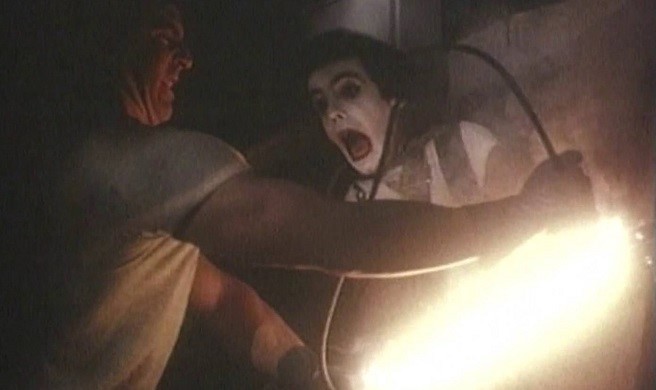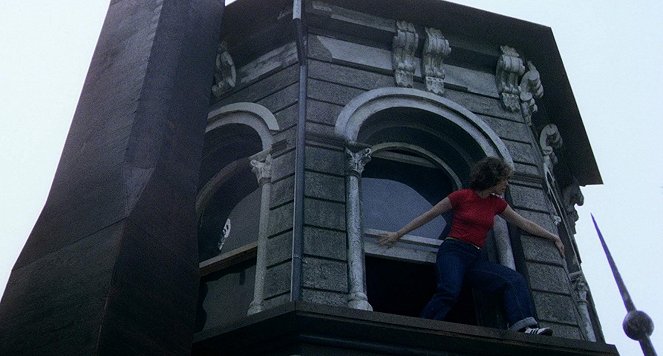– The Boys Next Door is the movie for the weekend. In this section every Saturday or Sunday Celluloid Dimension picks a movie for the weekend. The selections are preferably underrated movies or neglected movies that we think should get more attention. Have fun with these recommendations. –
Directed by Penelope Spheeris
Written by Glen Morgan and James Wong
Starring:
- Charlie Sheen as Bo Richards
- Maxwell Caulfield as Roy Alston
- Patti D’Arbanville as Angie
- Christopher McDonald as Detective Mark Woods
- Hank Garrett as Detective Ed Hanley
- Paul C. Dancer as Chris
Rating: ![]()
 There’s a strange allure in watching a young, smoldering Charlie Sheen and the sharp, sinewy Maxwell Caulfield revel in anti-social defiance—still radiating an intoxicating charisma as they spiral into violent machismo. If John Hughes painted adolescence as a journey toward self-betterment, Spheeris strips away the illusion. Her vision is unflinching, rejecting the nostalgic optimism of the ’80s in favor of a grittier, subversive truth—one that speaks not of reform, but of survival in the twisted, ever-pulsing heart of Hollyweird and its underground currents. To suggest that the pop-culturization of America has left no scars is to overlook one of the central ailments of modernity. Roy and Bo’s chaotic excursion through L.A. reveals an unsettling truth—American ideals, once foundational, have now become pulp fiction: commodified, distorted, and devoured.
There’s a strange allure in watching a young, smoldering Charlie Sheen and the sharp, sinewy Maxwell Caulfield revel in anti-social defiance—still radiating an intoxicating charisma as they spiral into violent machismo. If John Hughes painted adolescence as a journey toward self-betterment, Spheeris strips away the illusion. Her vision is unflinching, rejecting the nostalgic optimism of the ’80s in favor of a grittier, subversive truth—one that speaks not of reform, but of survival in the twisted, ever-pulsing heart of Hollyweird and its underground currents. To suggest that the pop-culturization of America has left no scars is to overlook one of the central ailments of modernity. Roy and Bo’s chaotic excursion through L.A. reveals an unsettling truth—American ideals, once foundational, have now become pulp fiction: commodified, distorted, and devoured.
Fueled by unequivocal misanthropy, The Boys Next Door dismantles the media’s frivolous depiction of sociopathy in ’80s culture. But beneath its critique lies something equally potent—pure adolescent rage, lashing out at the status quo for no reason other than the raw impulse to resist. Picture Badlands, but sleazier, starring Charlie Sheen morphing into his father, filtered through the punk rebellion that Spheeris loves to hint at. Maxwell Caulfield, wild-eyed and ruthless, channels every unhinged Hollywood heartthrob in an exploitation-fueled Rebel Without a Cause. But what fuels Roy and Bo’s reign of chaos? Certainly, they have a reason—but the satire lingers in an ambiguous realm between mockery and sincerity, refusing to define itself. If there is a sociological truth, perhaps it lies in their devotion to senseless destruction—a form of misanthropy, their quiet war against the world. The simplest cinematic truth? This is adolescent fury, sharpened by television’s excesses and the mythic glow of American crime. If the fixation on criminality—fetishized for decades in Hollywood noirs and gangster films—is more than theory, then this is its most mesmerizing realization. Caulfield doesn’t just perform; he embodies adolescent misanthropy with a cold-blooded, clinical precision that chills the screen. His face—a requiem of youth gone wrong—captures an unsettling contradiction: it is both deeply poignant and deeply disturbing. If many ’80s films sought to erode the idealism of coming-of-age narratives, this one obliterates it entirely, standing as perhaps the genre’s darkest rejection.








